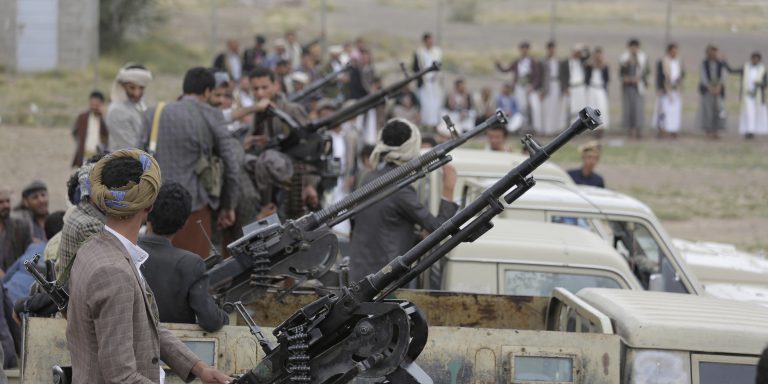INTELBRIEF
November 23, 2020
IntelBrief: Houthis Resilient Against U.S. And Gulf Pressure

Bottom Line Up Front:
- The United States and its Gulf allies have failed to significantly roll back the battlefield gains or military capabilities of Yemen’s Houthi movement.
- As it did for Lebanese Hezbollah, Iranian support has helped build the Houthis into a political power and a strategic force-multiplier for Iran.
- The designation of the Houthis as a Foreign Terrorist Organization (FTO) could complicate peace and humanitarian efforts without setting back Houthi capabilities.
- The Trump administration wants to block efforts by the Biden administration to distance U.S. policy from Saudi Arabia and the UAE and to re-engage with Iran.
Senior members of the Houthi family formed the ‘Ansar Allah’ (Partisans of God) movement in northern Yemen in 2004 as a rebellion against central authority, in line with their Zaydi Shia ideology against corruption and unjust rulership. As Zaydi Shias, the Houthis had few, if any, ties to Iran, whose population adheres mainly to Twelver Shiism and whose leaders saw in the Houthis little immediate strategic benefit. The 2011 Arab Spring uprisings that toppled Yemen’s longtime strongman Ali Abdullah Saleh, coupled with the Houthi capture of the capital, Sanaa, in late 2014, caused Iran to move to exploit the Houthi breakthroughs. Saudi Arabia and the UAE, supported by other Gulf state forces, intervened militarily in March 2015 to roll back Houthi advances and deny Iran an additional foothold in the region.
The Saudi-led intervention triggered Iran to deploy its well-honed regional ‘playbook’ for advancing Tehran’s regional objectives – a playbook used to significant effect in Lebanon, Iraq, and elsewhere. Iran began providing the Houthis with progressively more sophisticated arms, enabling the faction to advance on the battlefield, as well as help Tehran project power against Saudi Arabia and the key shipping lanes of the Bab el-Mandeb Strait. As it did for Lebanese Hezbollah, Iran is nurturing the Houthis into a significant politico-military force that will likely obtain a significant share of power in post-conflict Yemen. Even with U.S. logistical support, the Saudi-led coalition has been unable to recapture significant territory. The outcry over civilian deaths in Yemen, coupled with the lack of military progress, caused the UAE to withdraw its ground forces in 2020, although UAE forces remain in southern Yemen and the UAE backs the Saudi hardline on a potential peace settlement.
Iranian military support has enabled Tehran to use the Houthis as a proxy to pressure Saudi Arabia itself. Iran has supplied the group with drones and missiles that are able to reach deep into Saudi Arabia—for example, Iran smuggles the Burkan 2-H medium-range ballistic missile into Yemen in parts and then helps the Houthis assemble it in factories. The Houthis have fired such missiles regularly, damaging airports, oil facilities, and other infrastructure. The Houthis have fired Iran-supplied coastal cruise missiles, based on China’s C-802, on a UAE and even a U.S. ship in the Bab el-Mandeb. Iran has also built missile infrastructure for the Houthis: one Houthi video showed a launch vehicle rising out of the desert floor. The Houthis’ growing role as a force multiplier for Tehran is contributing to reported consideration of designating the Houthis as a Foreign Terrorist Organization (FTO) before President Trump leaves office in January. The Houthis have not generally committed deliberate acts of violence against civilians, and they fight in uniform and in organized units, clearly identifiable as combatants. Still, U.S. terrorism designations of armed groups that work against U.S. interests, even if such groups do not fit classic definitions of ‘terrorist,’ are not necessarily unprecedented.
An FTO designation of the Houthis, reportedly to be issued by December 1, would resultantly disrupt the Biden administration’s plans to distance the United States from Saudi Arabia and the UAE and to shift policy on Iran. An FTO designation, by associating the Houthis with the IRGC-QF, will stoke opposition to the Biden administration’s intent to rejoin the 2015 multilateral Iran nuclear deal that President Trump abrogated in 2018. The designation will embolden those that support continued close U.S. alignment with Saudi Arabia and UAE and their opposition to any Yemen settlement that gives the Houthis significant power. Mediators and humanitarian groups argue that designating the Houthis as an FTO will set back mediation efforts and hinder the delivery of humanitarian aid to Yemeni civilians. The FTO designation makes criminal the provision of ‘material support’ (funding, donations) to an FTO. No matter what ‘carve-outs’ are provided for humanitarian transactions, the designation will deter organizations from dealing with the Houthis, who control substantial territory. Yet, presidents generally have substantial latitude on foreign policy—the Biden administration would likely be able to accomplish its desired policy shifts despite hurdles erected by the outgoing Trump administration.